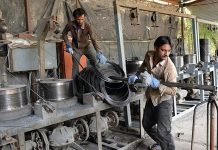This article has been authored by Bhavika Mittal, pursuing BA LLB at Shri Navalamal Firodia Law College, Pune. This article is a detailed account of Section 33 of the Industrial Disputes Act of 1947, which prevents the victimisation of employees by employers at the time of pending proceedings. Additionally, the article showcases how the section is not absolute in its sense by permitting the altercation of services under certain circumstances. Further, the amendments like provisions for a protected workman, made to the section are also mentioned.
This article has been published by Sneha Mahawar.
Table of Contents
Introduction
Laws have multiple functions. One such vital role is that it is a middle ground between disputing parties. One such legislation which resolves disputes between workman and employer, workman and workman, is the Industrial Disputes Act of 1947. Apart from resolving disputes, the act safeguards workmen’s and employers’ interests during proceedings. Chapter VII of the Industrial Disputes Act 1947, titled “Miscellaneous,” provides Section 33, which keeps a check on the employer to make changes in conditions of service, etc., during the pendency of proceedings.
When a workman initiates or continues any proceeding against the employer, or the company, the probability of the workman being victimised is high. Section 33 of the Industrial Disputes Act 1947 aims to protect the workman from victimisation. Additionally, the section ensures to terminate the pending proceedings peacefully and restores harmony. The ban on employers is not absolute; there are certain exceptions, which are added by way of the 1956 amendment. The provisions of and amendments to the section are discussed herein.
Prohibition on Employers
Section 33(1) of the act prohibits employers to undertake certain actions during the continuation of a dispute. The section is bifurcated into two sub-clauses, (a) and (b). Their respective provisions are as follows:
- Not to alter terms of service
Section 33(1)(a) of the Industrial Disputes Act 1947 completely prohibits the employer’s right to terminate the services of his employees. For workmen to seek protection under the Section, the following conditions must be satisfied.
- There should be an industrial dispute pending before the appropriate authority.
The period between the commencement and conclusion of conciliation, adjudication, or arbitration proceedings is the period of pending proceedings. As stated by the court in Karnal Kaithal Co-operative Transport Society v. State of Punjab, 1958.
- The authorities with jurisdiction over industrial disputes are the Conciliation officer or Board, Arbitrator, Labour Court, Tribunal, or National Tribunal.
- The workman should be concerned in the pending proceedings.
- The alteration of the services made by the employer shall be regarding the matter of the pending proceeding. It shall also be prejudicial to the interest of the workman.
- Additionally, the alteration should affect changing the conditions of service. These services apply to the workman before the commencement of such proceedings.
Meaning of alteration in the conditions of service
The definition of alteration has not been specified, but from judgments over the years, it can be deduced as what constitutes “alteration”.
In National Coal Co. v. L.P. Dave, 1956, the industrial dispute was about paying full pay and allowance to workmen on Independence day and Republic Day. The court held that any reduction or cut in workmen’s wages is an alteration.
While in Lakshmi Devi Sugar Mills v. Pt. Ram Sarup, 1956, lock-out has been held to not be an alteration in the service conditions. In the instant case, seventy-six workers went on a strike as a co-worker was dismissed. The management sought to prevent the entry of the workers, but they violently did. Later that day, a lock-out was declared.
2. Not to discharge or punish
Section 33(1)(b) of the Industrial Disputes Act, 1947, prohibits the employer from taking disciplinary action against the workman for misconduct connected with the dispute. The workman shall be concerned in such dispute. Along with this, the Section requires that the action proposed to be taken should be connected with discharge or punishment by dismissal or otherwise.
This discharge should be regarding any misconduct connected with the pending dispute. In Sasa Musa Sugar Works (P) Ltd. v. Shobrati Khan and others,1959, the appellant had served notices on forty-eight employees as they participated in go-slow (deliberately delaying the work). The Tribunal disallowed the application of dismissal. But the Supreme Court allowed the appeal and granted the dismissal of workers as there was sufficient evidence of misconduct. The court held that the Tribunal must accord permission under Section 33 when it is satisfied with the evidence of misconduct of the workmen.
But where there is express written permission from the authority before whom the proceeding is pending, the employer has the power to discharge or punish the workman. The employer is empowered to suspend the concerned workman based on the enquiry’s verdict without applying for permission. Thus, the restrictions imposed on the employer are not absolute.
In East India Coal Co. v. P.R. Mukherjee, 1959, there were two applications. The Tribunal rejected one of them and justified the discharge order, which could become a subject matter for future disputes. Thus, it was held that when permission of an Industrial Tribunal is asked for the discharge of the workmen under Section 33, the only duty of the Tribunal is to accord the permission or withhold it.
While carrying out disciplinary action against the workman, a fair domestic enquiry is required.
Domestic enquiry
The guidelines for carrying out a domestic enquiry should adhere to the principle of natural justice as there is no statutory provision governing this subject matter. Before charging a workman with disciplinary action, the employer is required to hold a domestic enquiry. This enquiry includes allowing the employee to represent their case adequately.
In Martin Burn Ltd. v. R.N. Banerjee, 1957, the respondent was under the appellant’s employment; over time, his work became unsatisfactory, an enquiry into his work service was held, and he was held unsuitable to work. An application was filed for discharge but was refused by the Tribunal as no prima facie case. The Supreme Court upheld the judgment and held that prima facie guilt is established after holding a fair domestic enquiry following the principle of natural justice.
Circumstances in which the Employer is allowed to alter, discharge or punish
Section 33(2) deals with alteration in the conditions of service and discharge or dismissal of a workman who is connected to a pending dispute, but such action is taken in regard to a matter not connected to the pending dispute. Sub-section 2 contains two sub-clauses.
Section 33(2)(a) states that the employer can alter the services applicable to the workman before the commencement of proceedings.
While Section 33(2)(b) states that the employer can for the misconduct of the workman discharge or punish by way of dismissal or otherwise. the matter certainly shall not be connected to the pending dispute.
In order to exercise the powers of discharge or dismissal, the proviso to Section 33(2)(b) requires two conditions to be fulfilled. If the requirements are not satisfied, the management’s application is liable to be dismissed. In the case of Podar Mills Ltd. v. Bhagwan Singh and Anr.,1974, the appellant’s application for approval of dismissal was refused by the Tribunal on grounds for delay in making an application of approval; the Supreme Court upheld the judgment. The conditions are
- The concerned workmen should be paid wages for one month. These one-month wages include all prior wages plus the wages for the next month. The court viewed in Prabhakar H. Manjare v. Indian Telephone Industries Ltd., 1998, where the application of approval was denied and held illegal as one month’s back wages were not paid. Concludingly, the appellant’s appeal was granted, restoring his services, and he was entitled to all consequential benefits.
- The employer must make an application before the appropriate authority for approval of the action taken by the employer.
Based on the proviso to Section 33(2)(b), it contemplates
- dismissal or discharge,
- the payment of wages, and
- making an application for approval.
Further, the principles to be considered by the Tribunal before granting or refusing approval under Section 33(2)(b) are to observe:
- Whether standing orders justify orders of dismissal,
- Whether the enquiry has been held as prescribed by Standing Orders, and
- Whether the conditions laid down in the proviso of Section 33(b) are fulfilled.
In G.K. Sengupta v. Hindustan Construction Co. Ltd.,1994, the appellant was an employee who was charged for showcasing indecent behaviour. The approval application sent to Maharashtra Tribunal was accepted. This judgment was challenged in the Bombay High Court as the Tribunal, without proceeding with the hearing of the application granted it.
The court held that before granting or refusing approval under Section 33(2)(b), the Tribunal must give a reasonable opportunity to hear the parties concerned.
Regarding the relationship between the employer and workman at the time of proceedings under Section 33. Only the de facto relationship ends when an order to discharge or dismissal is passed, but the de jure relationship ends only when the Tribunal accords approval.
In S.Ganapaty and Ors. v. Air India and Anr., 1993, where the employees were dismissed due to disciplinary action. The one-month wage was given after the deduction of tax, the grounds of the appeal. As the de jure relationship is still present, the content and character of wage would remain the same. Thus, the appeal was dismissed.
What is a Protected Workman
Section 33(3) was inserted in the Industrial Disputes Act, 1947, by way of amending the Act in 1956. With this section’s help, a new class of “protected workmen” was developed.
Explanation to Section 33(3) defines a protected workman as any workman who is a member of the executive or other office bearer of a registered trade union connected to the establishment.
Union of India v. Rajasthan Annushakti Karamchari Union Rawatbhata, 1976, defines a protected workman as someone who enjoys immunity against being dismissed or discharged during adjudication or conciliation proceedings relating to an industrial dispute pending between the workmen and the employer. The case deals with whether the time limit mentioned in Rule 61 is mandatory or directory. The court held that it was mandatory.
Provisions and limitations relating to Protected Workmen
A workman is recognised as a protected workman where the Rule 61 of the Industrial Disputes (Central) Rules is applicable.
Rule 61 of the Industrial Disputes (Central) Rules deals with the recognition and distribution of protected workmen. It contains four sub-rules, them being
- Every registered trade union must communicate the names and addresses of office bearers to the employer for the recognition of a protected workman by 30th April of every year.
- It is the duty of the employer to declare the list of protected workmen within 15 days of receiving the letter from the union.
In P.H. Kalyani v. Air France, Calcutta, 1963, the appellant had challenged his dismissal, which was denied. The court held that the employer must show positive action by sending his confirmation of the recognised protected workmen before the worker can claim to be a protected workman.
In Divisional Controller MSRTC v. Conciliation Officer Akola and Anr,1993, the court held that where the union sends only one name, such a workman is bound to accept the privilege. In the case, declaring respondent No.2 as a protected workman was challenged. The appellant stated that this was impossible as no list regarding the number of workmen was sent. The application contained only one name, which was accepted.
- Where any dispute arises between the employer and registered trade union related to the matter of recognition of protected workmen, the dispute is referred to Regional Labour Commissioner or Assistant Labour Commissioner (Central).
- The rule prescribes the number of workmen to be recognised as protected workmen. Section 33(4) of the Industrial Disputes Act 1947 provides provisions for the same. It states that one percent of the total number of workmen employed is subject to a minimum of five and a maximum of one hundred.
The employer can refuse to recognise a protected workman if the case is within the statutory grounds of Section 33(4). The court held this in R Balasubramanian and Ors. v. Caebarandum Universal Ltd, 1975, where a petition was filed stating that there was no infringement to Section 33(3) of the Act because the petitioners were not proven to be protected workmen at the time of the dismissal order. The Gujarat High Court allowed the petition.
Finally, this protection is available to every registered trade union related to the establishment. The maximum number of protected workmen varies.
Approval of any action under sub-section (2) taken by the employer
The provisions for the approval of actions taken by the employer under sub-section (2) are provided under Section 33(5) of the act. Sub-section (5) states that the concerned authority, without any delay, shall hear and pass the application. This process shall be concluded within three months from the date of receipt of the application; such was substituted by Act 46 of 1982.
Further, the Act 46 of 1982 added a proviso to the sub-section that if the authority deems it necessary, it may extend the period further in writing.
Landmark Cases
Lord Krishan Textile Mills v. Its Workmen, 1961
In Lord Krishan Textile Mills v. Its Workmen, 1961, two officers were assaulted by workmen. Upon domestic enquiry per standing orders, the workmen were found guilty and consequently dismissed from employment. As a dispute of bonus payment was pending before the Tribunal, the appellant applied for dismissal. The Tribunal denied the approval, an appeal against the order was made in the Supreme Court, and the same was set aside.
The case is a landmark case of Section 33 as it laid down principles that showcased clarity. Firstly, the Supreme Court illustrated the distinction between Section 33(1) and Section 33(2) concerning the scope of enquiry.
| Section 33(1) | Section 33(2) | |
| Permission | obtaining express permission is necessary. | obtaining express permission is not a necessity but must fulfill the specified conditions. |
| Jurisdiction | the jurisdiction of the authority to grant or withhold permission is broad. | permission not being a necessity, the jurisdiction is narrow. Also, under Section 33(2)(a), no approval is required, and the right of the employer remains unaffected by the ban. |
The court pronounced that the appropriate authority should be actively aware that there are two classes of cases, and the separating line between the two sub-sections is providing express permission in only approval in another.
Secondly, the court observed that, even though express permission in writing is not required in cases under Section 33(2)(b), there should be no time lag between the action taken by the employer and the order passed by the authority.
Next, the court also upheld the proviso to sub-section (2) and held that satisfying those conditions is required before dismissing a workman.
Strawbroad Manufacturing Co. v. Gobind, 1962
In this case, the respondent was an employee who did not comply with officers’ orders repeatedly. He was suspended based on the enquiry. Further, the appellant dismissed the respondent. The employer sent applications for approval. The approval was refused because the application was made after dismissal. Then, the appellant appealed to the apex court.
The Supreme Court in Strawbroad Manufacturing Co. v. Gobind, 1962, answered whether the application for approval should be made before or after the employer’s discharge or dismissal action.
The court, upon consideration of three things under the proviso of Section 33(2)(b), held that a dismissal order could be passed and an application under Section 33(2)(b) could be taken thereafter. The court held that such an action is an inchoate condition. But dismissal, payment of one month’s wages and making an application should take place simultaneously and be part of the same transaction.
Further, if the order of approval is not granted under the section, the order of dismissal becomes ineffective from the date it was passed. Thus, the employee would be deemed as never to be dismissed or discharged and entitled to wages from the date of dismissal to the date of disapproval.
Conclusion
The procedure for reaching the final verdict is long. Thus, there are numerous pending proceedings; new disagreements could arise. Section 33 of the Industrial Disputes Act of 1947 governs such situations between employers and employees. It ensures to avoid victimisation of employees and avoids an absolute ban on the employer’s powers. Instead, the section does not take away any existing management rights. It only requires them to submit its action for scrutiny.
Frequently Asked Questions (FAQs)
What are Standing Orders?
Generally, Standing orders are procedures that continue to be followed until changed or cancelled. While, for the matter of Industrial Disputes Act, it means that the management formally defines the condition of employment.
What is meant by workman concerned?
The workman against whom action is taken in a dispute is said to be the workman concerned. In New India Motors Ltd. v. K.T. Morris, 1960, the court held that the “workman concerned” also includes those on whose behalf the dispute has been raised and are bound by the award which may be made in the dispute.
References
- An introduction to labour and industrial laws by Dr S.K. Puri
- Handbook of labour and industrial law by P.L. Malik
- https://thelawbrigade.com/wp-content/uploads/2019/05/Rahat-Dhawan.pdf
Students of Lawsikho courses regularly produce writing assignments and work on practical exercises as a part of their coursework and develop themselves in real-life practical skills.
LawSikho has created a telegram group for exchanging legal knowledge, referrals, and various opportunities. You can click on this link and join:
Follow us on Instagram and subscribe to our YouTube channel for more amazing legal content.
 Serato DJ Crack 2025Serato DJ PRO Crack
Serato DJ Crack 2025Serato DJ PRO Crack










 Allow notifications
Allow notifications


